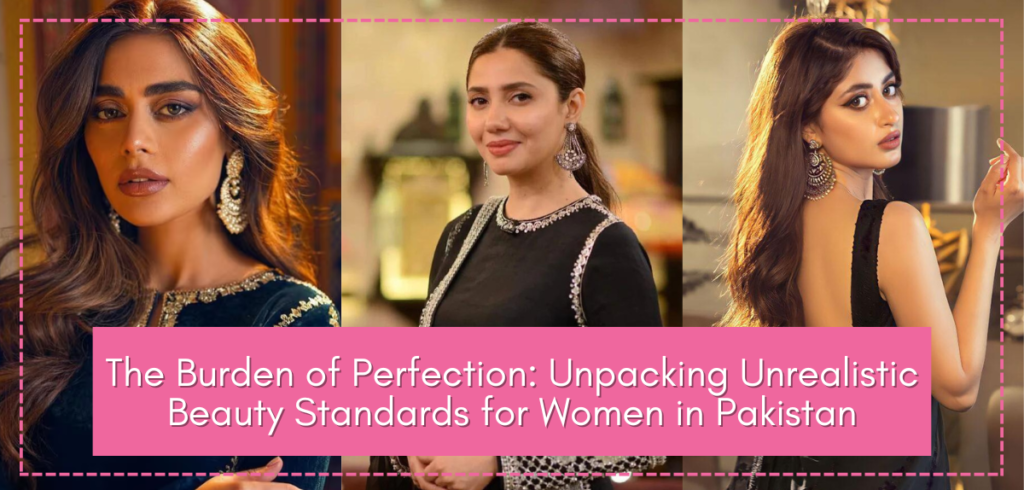Like in many other socities, Pakistani society might have widespread and unrealistic expectations for women’s attractiveness. The demands put on women can be excessive, affecting their self-worth, mental health, and general well-being, and ranging from having fair complexion to having a specific physical type. We will examine the causes of these beauty standards, how they affect women, and our options for creating a society that is more accepting and powerful in this blog.
The Roots of Unrealistic Beauty Standards:
In Pakistan, unrealistic beauty standards are engrained in society expectations, media representations, and cultural conventions. Fair skin has always been valued as a sign of attractiveness and is frequently connected to social standing and money. Since colonial times, people have preferred to have fair skin, and this preference has lasted through the generations thanks to media portrayals and commercials for fairness creams.
Furthermore, conventional gender roles have a big influence on what constitutes beauty. It is common for women to be expected to exemplify femininity, which might involve keeping a perfect complexion, long hair, and slender figures. In conservative cultures, where women’s behavior and looks are extensively examined, these standards might be very strict.
The Impact on Women:
The stress of having to live up to unattainable beauty standards can be detrimental to women’s mental and self-esteem. Many women claim to have low self-confidence and body dissatisfaction as a result of feeling inadequate or insecure about their appearance. Numerous psychological problems, such as eating disorders, anxiety, and depression, may be exacerbated by this.
However, the unrelenting quest for perfection can have real-world repercussions, like overspending on cosmetic operations and goods and beauty treatments that could be dangerous. In extreme circumstances, women may turn to risky weight-loss or skin-whitening procedures, endangering their health in the process of achieving an unreachable ideal.
Challenging the Status Quo:
Unrealistic beauty standards are widespread in Pakistani society, yet there are indications of growth and opposition as well. Social media platforms have given women a voice to question conventional beauty standards and promote a range of attractive images. Advocates and influencers are use their platforms to spread acceptance, self-love, and body positivity.
In addition, the fashion and entertainment sectors are beginning to realize how important it is to promote greater tolerance and diversity. Fashion designers are questioning conventional ideas of beauty and representation by showing models with a range of sizes, shapes, and skin tones. In a similar vein, media producers such as filmmakers and content developers are presenting women as complex people with a range of experiences and looks.
Building a More Inclusive Society:
Systemic change and concerted action are needed to create a more inclusive society. In order to combat damaging beauty standards and advance tolerance and appreciation for diversity, education is essential. Teachings on body image, self-esteem, and media literacy can be incorporated into curricula offered by schools and community organizations to enable youth to assess media messages about beauty critically.
Legislators also need to encourage moral advertising practices and regulate the beauty business. Regulations governing cosmetic procedures and bans on skin-lightening products can both assist stop the development of detrimental beauty standards and shield customers from dishonest marketing practices.
Individually, each of us can play a part in creating a more inclusive society by confronting our own prejudices and backing initiatives aimed at tearing down harmful beauty standards that discriminate against women. This could entail speaking out against discriminatory beliefs and actions as well as elevating the voices of people calling for change.
In conclusion, Pakistani society’s exaggerated standards of beauty put excessive pressure on women to meet certain, frequently unachievable criteria of beauty. In addition to having an adverse effect on women’s mental health and self-esteem, these norms also reinforce negative stereotypes and disparities. Regardless of looks, we can create a society where all women feel respected and strong by questioning these standards and advancing inclusion and diversity.

